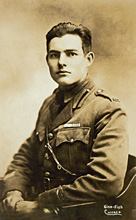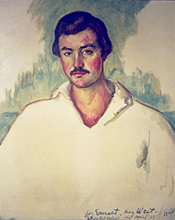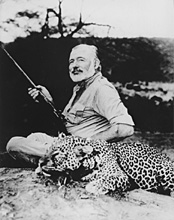


Earnest Hemingway



Earnest Hemingway
Earnest Miller Hemingway was borin in Oak Park Illinois.
After graduating from high school, he got a job at a paper
called "Kansas City Star". Hemingway continually tried to enter
the military, but his defective eye, hindered this task.Hemingway had managed to get a job driving an American Red Cross
ambulance. During this expedition, he was injured and
hospitalized.Hemingway had an affinity for a particular nurse at
that hospital, her name was Agnes von Kurowsky. Hemingway
continually proposed to her, and she continually denied.When Hemingway healed his injuries, he moved back to Michigan,
and had wanted to write again. Hemingway married Hadley
Richardson and was working in France, as a foreign corespondent,
for the "Toronto Star". In 1925, he wrote a book called "In Our
Time", which was marketed in New York. The next year he published
a book called "The Sun Also Rises", a novel where he had his
first success. The book deals with a group of desultory
people in exile from France and Spain-members of the "lost
generation", a phrase made famous by Hemingway himself.In post-war years, Hemingway spent most of his time writing
books. But, when his first marriage failed, and produced a son,
John, he had married Pauline Pfeiffer, who had his next 2
children. Based in Paris, he had travelled for skiing,
bullfighting, fishing, or hunting that by then had become what
most of his work was all about.Hemingway, started writing short stories, among them was "Men
Without Women" in 1927, and "A Farewell to Arms" in 1929.
This story ("A Farewell to Arms"), shows a lovestory within a war
time setting. Many people believe that Hemingway, did his writing
at this period of his life. He once confessed "If I had not been
hunting and fishing, I would have probably been writing."(Hemingway 283 (3)). Hemingway's stories were based on adventure,
and different aspects of it. His love of spain, and his love of
bullfighting, led him to write a book called "Death in the
Afternoon". During the 1930's, Spain was in a civil war, still
having ties in Spain, Hemingway made 4 trips their. He raised
money, for a party called the "Loyalists". He wrote a book about
it called "The Fifth Column". In this book, the narrator is the
protagonist. From more experience in spain, he wrote a book
called "Whom the Bell Tolls" in 1940. This book was the most
successful writing, based on sales of the book.All of Hemingway's life, has been fascinated by wars. For
example, in "A Farewell to Arms", he focussed on how war had no
meaning, and was futile. Following the war in Europe, Hemingway
returned to his home in Cuba, and his fourth marriage was with
Mary Welsh-a correspondent whom he had met in London and whom he
would be married to for the last time. In 1953, Hemingway
recieved a Pulitzer prize for his book "The Old Man and the Sea".As one critic put it "Hemingway was a cheerful, irascible, by
turns generous, and selfish, expansive and egocentric. Hemingway
was hedonistic and dedicated, in love with life and yet by his
own admission obsessed with death." (Hemingway 221 (2)).By 1960, Hemingway was driven out of Cuba (Because of Castro),
and moved to Finca, and then he moved to a house in Ketchum,
Idaho. Hemingway was suffering from severe depression, and
anxiety attacks. He had gone to the mayo clinic in
Massachusettes, to recieve electro-shock therapy, but
it didn't work out for him at all. Later that same year,
Hemingway ended his life, with a shot gun.